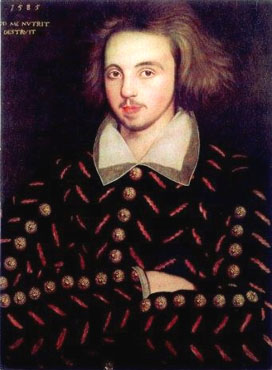Many months ago, I posted a message which pointed out that both Christopher Marlowe and George Sandys used the expression “infinite riches”. Since that time, I've had occasion to use Literature Online (a searchable, literary database subscribed to by most university libraries) to do some minor research on the use of “infinite” within the realm of poetry or drama.
At least five more authors besides Marlowe and Sandys use “infinite riches” in a poetic or dramatic work, viz. Chapman, Chivers, Harpur, Simpson, Tagore, and Woodford. But, even if it were only Marlowe and Sandys, it would prove nothing. “Infinite riches” comes from a memorable line in Marlowe’s The Jew of Malta, and so it may have a higher likelihood of being used inadvertently by another author. So, what about uses of “infinite” that are little more down in the literary noise: a little less memorable, a little less subject to being mimicked. I focused on the following three usages: (1) “as infinite as”, (2) “how infinite”, and (3) “so infinite”. Which authors use all three of these expressions in their works of poetry or drama?
The first expression, “as infinite as”, is used by 13 different authors including Shakespeare and Sandys. Of these 13 authors, only three use both “as infinite as” and “how infinite”, viz. Shakespeare, Sandys, and a Frederick William Orde Ward. Unfortunately, Ward does not use “so infinite”. So, the only two authors that use all three expressions are Shakespeare and Sandys. Again, it proves nothing, but it’s interesting and a little surprising.
Now, it turns out that Shakespeare and Sandys have yet more commonalities in their usage of infinite. Both use infinite to modify a plural noun by placing it after rather than before the noun, e.g. “considerations infinite” and “joys infinite”. And, if Edward III is included in the canon as Riverside has done, then both Shakespeare and Sandys use the expression “both infinite”. If Edward III is not included, then Shakespeare still says “both are infinite” in Romeo and Juliet.
So, my point is this: if Marlowe did indeed survive beyond 1593 (and to me, as well as many others, this is not so far-fetched) then he wrote Shakespeare’s plays and poems until about 1611. What about after 1611? Based on the commonality between Shakespeare and Sandys noted above, it is again not so far-fetched that Marlowe may have written the poetry of Sandys as well. I challenge all Marlovians here at HLAS to search all the poetical works of George Sandys for literary parallels with both Marlowe and Shakespeare. You may be amazed at what you find. But, of course, it proves nothing.
[above is taken from my HLAS post on April 25, 2003(edited)]
